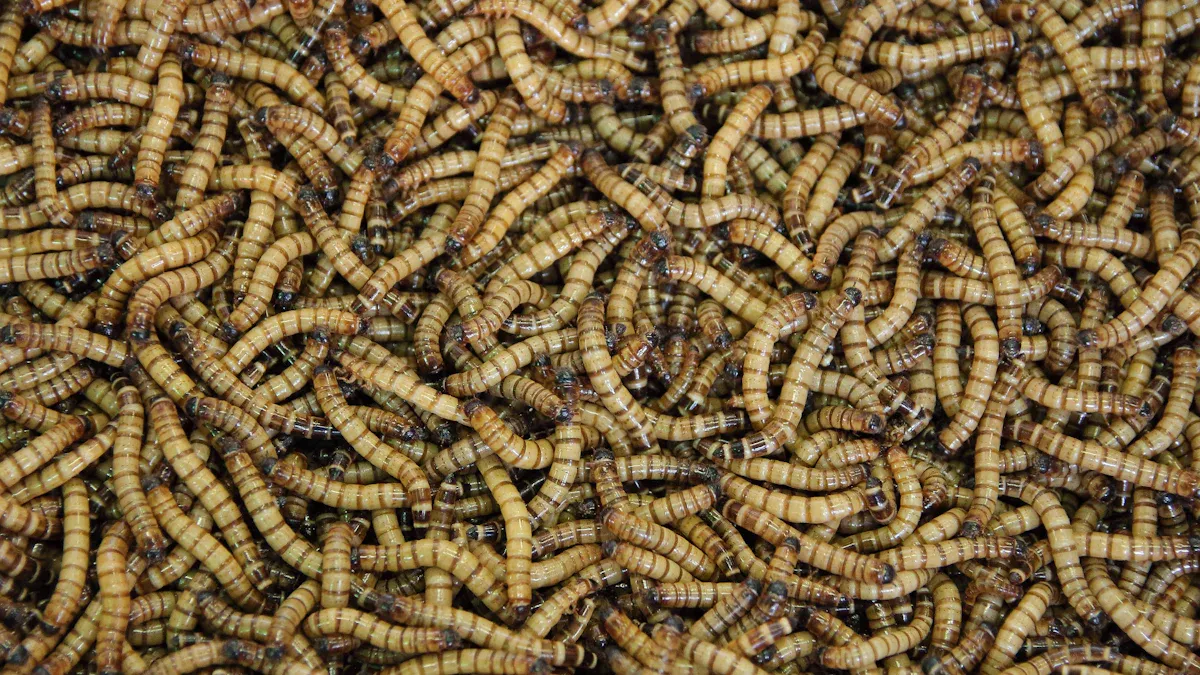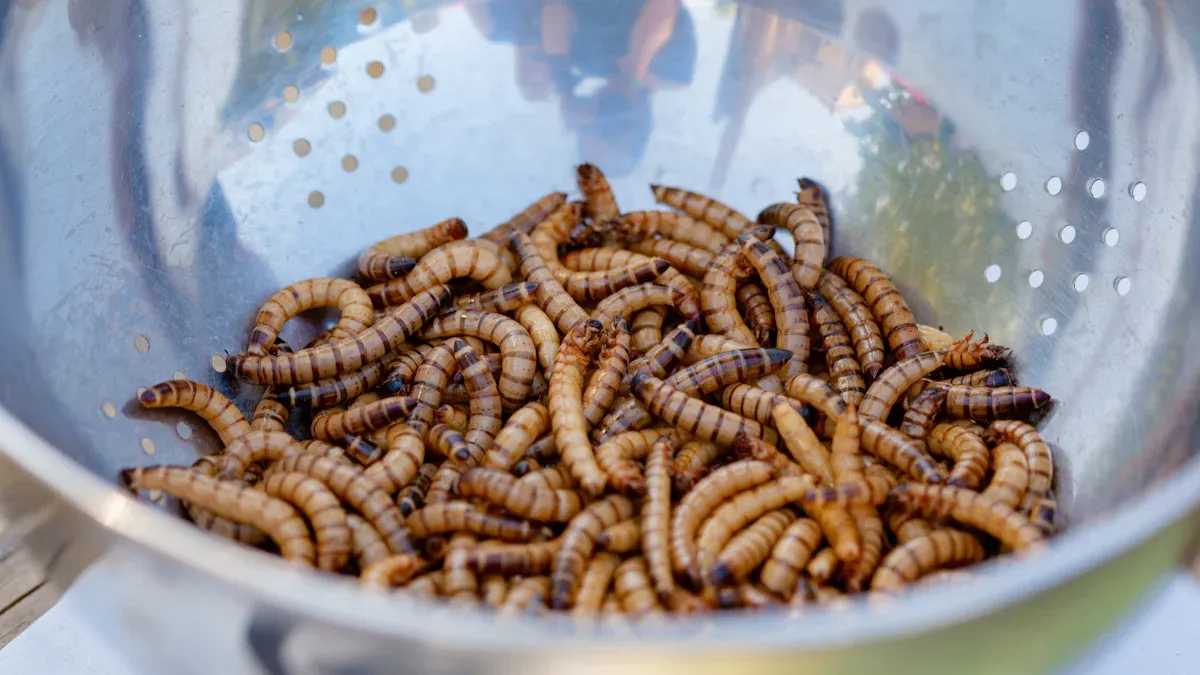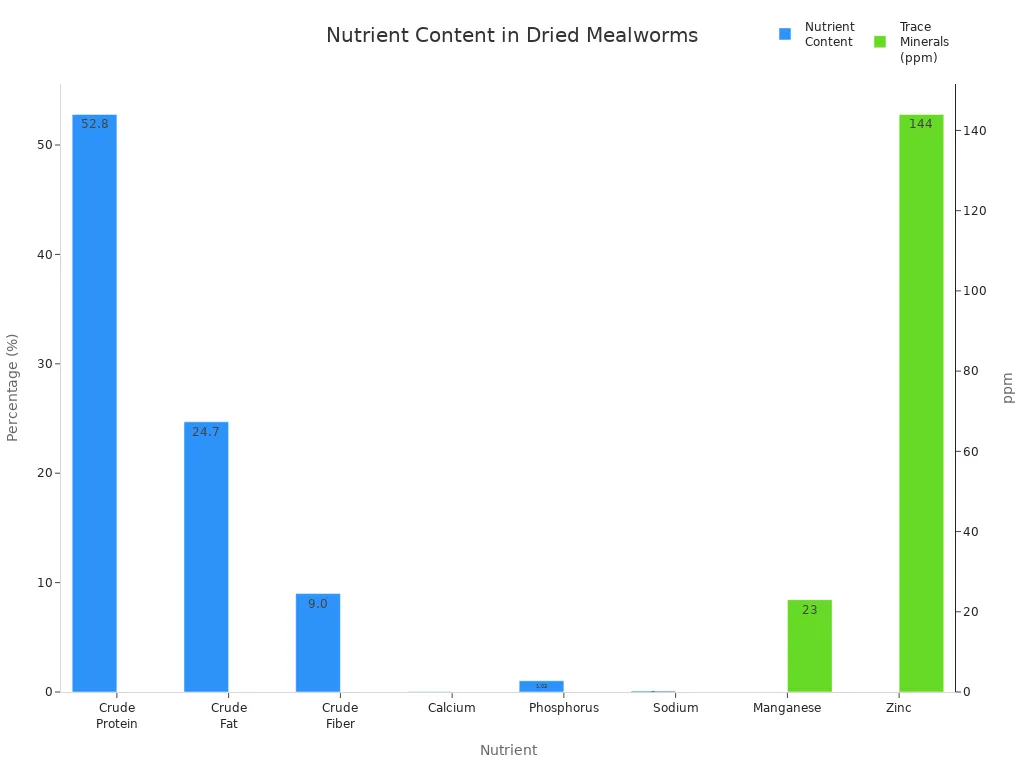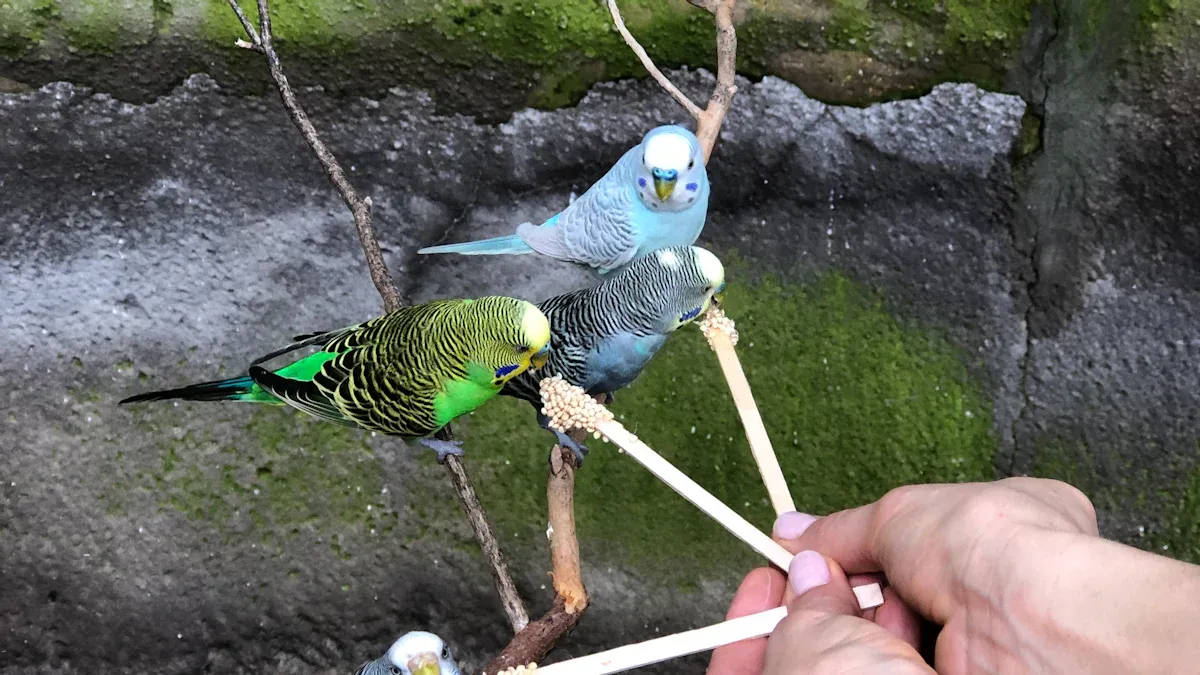
Feeding Dried Mealworms to Parrot offers a safe, protein-rich treat when given in moderation. Experts in avian biology confirm that dried mealworms do not cause digestive issues in healthy parrots. These treats supply essential nutrients and healthy fats, making them a practical supplement for most pet birds.
Key Takeaways
- Feed dried mealworms to parrots as a safe, protein-rich treat in moderation to support muscle growth, energy, and feather health.
- Always introduce mealworms slowly, watch for any signs of allergies or digestive issues, and stop feeding if problems occur.
- Store dried mealworms in a cool, dry place and choose high-quality products to ensure safety and maintain nutrition.
Feeding Dried Mealworms to Parrot: Safety and Suitability
Safety Considerations
Feeding Dried Mealworms to Parrot can offer many health benefits, but safety remains important. Parrots need a balanced diet, and too much protein can cause health problems, especially for non-breeding adults. Owners should always introduce new foods slowly. Start with a small amount of dried mealworms and watch for any changes in behavior or digestion. Some parrots may have sensitive stomachs or allergies. If a parrot shows signs of discomfort, such as loose droppings or lack of appetite, stop feeding mealworms and consult an avian veterinarian.
Dried mealworms should come from trusted sources. High-quality products reduce the risk of contamination and ensure the mealworms are free from harmful chemicals. Always check the packaging for freshness and proper storage instructions. Store dried mealworms in a cool, dry place to keep them safe for your parrot.
Tip: Offer dried mealworms as an occasional treat, not as a main food. This helps prevent overfeeding and keeps your parrot’s diet balanced.
Suitability for Different Parrot Species
Feeding Dried Mealworms to Parrot suits many species, but some parrots benefit more than others. Parrots that eat a mix of seeds, fruits, and insects in the wild often enjoy mealworms as a supplement. Mealworms provide animal-based protein and healthy fats. These nutrients help with muscle growth, energy, and feather health.
Many parrot owners have shared their experiences with different species. Some parrots show a strong preference for dried mealworms and gain noticeable health benefits. Here are a few species that often enjoy and benefit from this treat:
- Sun Conure
- Green Cheek Conure (gcc)
- Peach-fronted Conure
- Brown-throated Conure
- Quaker Parrot (Monk Parakeet)
These parrots often accept dried mealworms as part of their diet. Owners report that their birds show excitement and improved energy after eating mealworms. While scientific studies on parrots and mealworms remain limited, community feedback supports their use as a nutritious supplement.
Feeding Dried Mealworms to Parrot can also help during breeding season. Parrots need extra protein when raising chicks. Mealworms can provide this boost, supporting healthy growth for young birds.
Nutritional Value of Dried Mealworms for Parrots

Protein and Essential Nutrients
Dried mealworms stand out as a powerful source of protein for parrots. Protein helps parrots build strong muscles, repair tissues, and stay active. Compared to other common treats, dried mealworms offer much more protein. The table below shows the difference:
| Treat | Protein Content (%) |
|---|---|
| Dried Mealworms | 53 |
| Black Oil Sunflower Seeds | 15 |
Mealworms also provide essential nutrients. They contain about 53% protein, 24-27% fat, 6-9% fiber, and up to 15% moisture. Important minerals like calcium, phosphorus, sodium, manganese, and zinc support growth, energy, and overall health. These nutrients help parrots stay strong and healthy.

Healthy Fats and Minerals
Dried mealworms contain healthy fats that give parrots energy. These fats help brain function, support healthy skin, and keep feathers shiny. During molting or high activity, mealworms provide extra energy and help parrots grow new feathers. The fats in mealworms also include antioxidants, which protect cells and boost health.
Mealworms are rich in minerals such as iron, zinc, copper, calcium, phosphorus, magnesium, and potassium. These minerals play key roles in blood health, bone strength, muscle function, and the immune system. Parrots need these minerals to stay active and resist illness.
Tip: Choose high-quality dried mealworms to ensure your parrot gets the best nutrition and safety.
Comparison to Other Parrot Foods
Dried mealworms offer a unique nutritional profile compared to seeds, nuts, and pellets. The table below highlights the differences:
| Food Type | Protein % | Fat % | Carbohydrates % | Key Micronutrients and Notes |
|---|---|---|---|---|
| Dried Mealworms | ~35 | ~50 | N/A | Calcium (~0.26%), Phosphorus (~0.23%), rich in B vitamins (B12, B2), natural animal protein. |
| Seeds & Nuts | 8 – 28 | 33 – 75 | 12 – 72 | High in fiber, healthy fats, vitamins E, folate, calcium, magnesium, potassium. |
| Pellets | N/A | N/A | N/A | Balanced nutrition, but less natural foraging stimulation. |
Mealworms provide more protein and fat than seeds and nuts. They also supply B vitamins and minerals that pellets may lack. Feeding dried mealworms encourages natural foraging, which keeps parrots mentally and physically active. For best results, use dried mealworms as a supplement, not a main food, to support a balanced diet.
Dried vs. Live Mealworms for Parrots
Practical Differences
Dried and live mealworms offer different experiences for both parrots and their owners. Dried mealworms are easy to store and do not need refrigeration. Owners can keep them in a cool, dry place, and they stay fresh for a long time. Dried mealworms are more economical and can be mixed with other foods. Some parrots, especially smaller species, show excitement when offered dried mealworms.
Live mealworms require more care. Owners must keep them in ventilated containers and store them in the refrigerator to prevent them from turning into beetles. Live mealworms need fresh vegetables for hydration. They are more expensive and need regular maintenance. Many birds find live mealworms more attractive because they move, which can encourage natural foraging behavior.
Tip: Dried mealworms are easier for most owners, while live mealworms can provide extra enrichment for curious parrots.
Nutritional Comparison
The nutritional value of dried and live mealworms differs in several ways. The table below highlights the main differences:
| Aspect | Dried Mealworms | Live Mealworms |
|---|---|---|
| Protein Content | Higher by weight (concentrated) | Lower by weight, but can be gut loaded |
| Moisture Content | Low (dehydrated) | High (provides hydration) |
| Nutritional Diversity | Mainly protein and fat | More diverse if gut loaded |
| Safety | Safer, fewer pathogens | Slight risk of parasites if not handled properly |
| Bird Preference | Accepted by many, especially small parrots | Preferred by some due to movement |
Dried mealworms have more protein and fat per gram because they lack water. Live mealworms offer hydration, which helps birds stay healthy, especially during hot weather. Owners can gut load live mealworms with extra nutrients, but dried mealworms do not have this option.
Safety and Hygiene
Safety and hygiene matter when choosing between dried and live mealworms. Dried mealworms go through a drying process that removes most pathogens. They are less likely to carry parasites and are easier to handle. Owners do not need to refrigerate them, and they can mix them with other foods.
Live mealworms can carry parasites like mites or tapeworms, though this is rare. Owners must wash their hands after handling live mealworms. Proper storage in the refrigerator keeps them fresh and prevents spoilage. Both types should come from reputable suppliers to ensure quality and safety. Responsible handling and moderation help keep parrots healthy and happy.
How to Feed Dried Mealworms to Parrot

Serving Methods and Preparation
Parrot owners can prepare dried mealworms in several ways to make them appealing and safe. First, select only healthy mealworms, removing any that look damaged or inactive. For dried mealworms, soaking them in a small amount of water for a few minutes can make them softer and easier for parrots to eat. Avoid leaving them damp for long periods to prevent spoilage. Some owners choose to sauté mealworms with mild herbs to enhance flavor, but always avoid strong spices.
Tip: Slightly moist mealworms often attract parrots more than dry ones.
Recommended Quantity and Frequency
Feeding Dried Mealworms to Parrot should always follow moderation. Most parrots benefit from mealworms as an occasional treat, not a daily staple. Offer a small pinch (about 2-4 mealworms) once or twice a week for medium-sized parrots. Overfeeding can cause digestive problems because mealworms have a hard exoskeleton and high protein content. Too many mealworms may also reduce the moisture and roughage in a parrot’s diet, leading to constipation or nutritional imbalance.
- Risks of overfeeding include:
- Digestive issues from hard exoskeletons
- Constipation due to low moisture
- Nutritional imbalance if mealworms replace other foods
Integrating Mealworms into a Balanced Diet
Feeding Dried Mealworms to Parrot works best as part of a varied diet. Parrots need fruits, vegetables, grains, and pellets for complete nutrition. Owners can improve the nutritional value of mealworms by gut loading them with vegetables or dusting them with calcium powder before feeding. This helps prevent calcium deficiency and supports healthy bones and eggshells. Dried mealworms provide protein, amino acids, and minerals, which support molting, growth, and egg production. Always combine mealworms with other healthy foods to keep parrots strong and active.
Risks and Precautions When Feeding Dried Mealworms to Parrot
Overfeeding and Moderation
Parrots enjoy mealworms, but too many can cause health problems. Overfeeding may lead to obesity or kidney strain because of the high protein content. Owners should give dried mealworms as a treat, not as a main food. A small amount once or twice a week works best for most parrots. This approach helps keep their diet balanced and prevents health issues.
Note: Always measure the portion before serving. Consistent portions help avoid accidental overfeeding.
Allergies and Sensitivities
Some parrots may show allergies or sensitivities to new foods. Signs include itching, feather plucking, or changes in behavior. Owners should watch their birds closely after introducing dried mealworms. If a parrot reacts badly, stop Feeding Dried Mealworms to Parrot and consult a veterinarian. Each bird reacts differently, so careful observation is important.
Signs of Digestive Issues
Digestive problems can happen if a parrot eats too many mealworms or cannot digest them well. Common signs include loose droppings, vomiting, or loss of appetite. Owners should check their parrot’s droppings and energy levels after feeding new treats. If any problems appear, remove mealworms from the diet and seek advice from an avian vet.
- Watch for:
- Unusual droppings
- Lethargy
- Refusal to eat
Quick action helps keep parrots healthy and happy.
Storage and Sourcing Tips for Dried Mealworms
Proper Storage Methods
Parrot owners can keep dried mealworms fresh and safe by following a few simple steps. Storing mealworms in airtight containers helps block out moisture and air. This method keeps the mealworms crisp and prevents spoilage. Placing the container in a cool, dry, and dark spot protects the mealworms from heat, light, and humidity. These factors can cause the mealworms to spoil or lose nutrients.
- Use airtight containers to keep out moisture and air.
- Store in a cool, dry, and dark place.
- Avoid refrigeration, which can cause condensation and spoilage.
- Freezing is possible if the container is sealed tightly to prevent freezer burn.
- Check mealworms often for any signs of spoilage, such as bad smells, mold, or changes in color and texture.
Tip: Proper storage can help dried mealworms stay fresh for up to two years, keeping their nutritional value high.
Choosing Quality Mealworms
Selecting high-quality dried mealworms ensures parrots get the best nutrition and safety. Look for mealworms with high protein content, usually over 50%. Quality mealworms also contain important vitamins like B12 and B5, fiber, and Omega-3 fatty acids. These nutrients support muscle growth, feather health, and a strong immune system.
- Choose mealworms that are non-GMO and 100% natural.
- Check for premium quality through careful selection, cleaning, and drying.
- Make sure the packaging is compostable or environmentally friendly.
- Look for products free from contaminants and with a long shelf life.
- Select mealworms that are easy for birds to eat and handle.
High-quality dried mealworms can be served alone, mixed with other foods, or used as a training treat. They help mimic a parrot’s natural diet and support overall wellbeing.
Dried mealworms give parrots a protein-rich treat. Owners should feed them in moderation. Always add mealworms to a balanced diet. Watch for any negative reactions.
- Store mealworms in a cool, dry place.
- Choose high-quality products for safety.
Parrots thrive when owners provide safe, nutritious treats.
FAQ
Can all parrots eat dried mealworms?
Most parrots can eat dried mealworms as a treat. Owners should check with a vet before feeding them to very young or sick birds.
How should owners introduce dried mealworms to a parrot’s diet?
Start with a small amount. Watch the parrot for any changes. Increase the quantity slowly if the bird shows no negative reactions.
Do dried mealworms replace other protein sources for parrots?
Dried mealworms do not replace other protein sources. Parrots need a balanced diet with fruits, vegetables, grains, and pellets.


